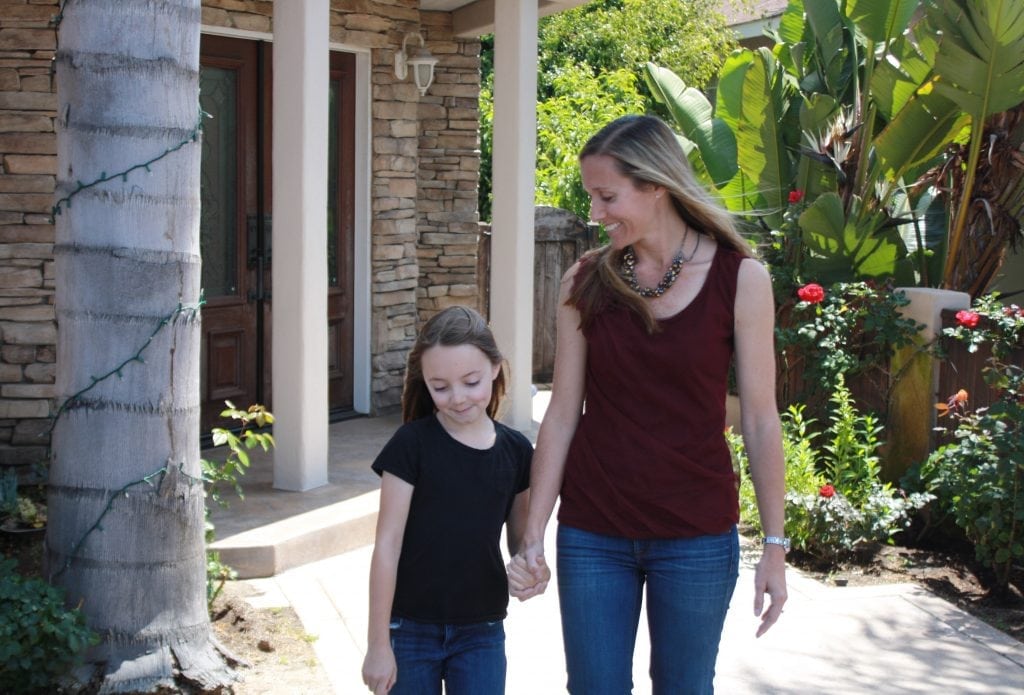
Author Katie Hurley takes time to catch up with her quiet child during their daily walk-and-talk. PHOTO BY SEAN HURLEY
Support at home and in the classroom can help these thoughtful kids find their voice.
In a loud world dominated by those who speak up, quiet kids can get overlooked, especially in school. These children are often highly observant and great listeners, which helps them collect information so they can succeed when it comes to written work and test taking. They often struggle, however, when group projects, presentations and class participation are required. If this sounds like your child, take heart. There are many ways to help quiet students find their voices.
Talk it Out
Early in each school year, share what you know about your child with the new teacher and fill him or her in about strategies that have helped in the past. “Most teachers appreciate a parent saying ‘I’d love to sit down with you for five minutes,’” says Azizi Williams, assistant director and director of admissions at Sequoyah School in Pasadena. “Teachers are interested in knowing a child’s learning style and parent concerns.”
Meanwhile, you should also talk to your child about her or his quietness. “Quiet shouldn’t be a detriment to learning, but sometimes kids need to understand how their brains work and why their learning style is a good thing,” says Katie Hurley, mom, psychotherapist and author of “The Happy Kid Handbook.” In your discussions, Hurley suggests replacing “quiet” or “introverted” with “thoughtful and observant,” to put a more positive spin on things.

Mom Lucy Ravitch doesn’t worry about her quiet 13-year-old daughter, who has lots of friends and is at the top of her class. PHOTO BY CALEB RAVITCH
Changing your child’s personality isn’t your goal. Hawthorne mother of five Lucy Ravitch says her 13-year-old daughter Katrina may be demure but is at the top of her class, has lots of friends and is helpful to others. Katrina’s teachers would love for her to speak up more as they’re certain she’d add interesting insights to most conversations, but they don’t push her. “Katrina’s very creative and a terrific artist but doesn’t like being in the public eye,” says Ravitch. “Her other positive qualities outweigh her quietness.”
Get Creative in the Classroom
At school, reserved students might seem disinterested or appear not to understand the material, but that’s not always the case. Many are deep thinkers, not chiming in until the end of a discussion after carefully considering their contribution. “Quiet children have a lot to offer in the classroom setting,” says Hurley. Some, however, remain silent, thinking they have nothing worthwhile to add.
During circle time at Joyce’s Play Ranch in Redondo Beach, Pre-K teacher Lauren Morales reads stories and asks what might happen next. Having the more verbal children answer first gives quieter students a chance to hear possible answers and develop well-thought-out responses.
Teachers can also minimize stress for reserved students by changing their seating so they’re around encouraging classmates, engaging them in special activities and putting them to work in small, structured groups. “Because reserved students often won’t say they need help, or [speak up when they] have a great answer, non-verbal strategies like a special pre-arranged hand signal give all children the opportunity to participate,” says Williams. “Teachers can also provide scaffolding, offering to stand next to a child during their presentation.”

[art: Lauren Morales.jpg] Teacher Lauren Morales of Joyce’s Play Ranch in Redondo Beach often lets more-verbal students set the example for those less inclined to speak up. PHOTO BY KEYERA FRANCIS
Practice At Home
Help your reserved child feel more comfortable speaking up at school by encouraging conversation at home. “Asking specific questions like ‘What was your favorite thing in art?’ or ‘Tell me something good that happened today,’ helps kids open up,” says Morales, as long as you don’t answer for your child or rush them. “It may take a child a good minute or two to really think about how they want to respond.”
If your child faces a public-speaking assignment, help him or her be well prepared. “[Students] can even practice at home by videoing themselves,” says Williams.
You can also use playtime to build speaking skills. Hurley suggests having your child pick a product from the pantry and make a speech to sell it to you. “Through play, kids discover their interests, develop social interaction skills, practice speaking up and working through problems and show their true personalities,” she says. You can also spend one-on-one time with your child shooting hoops, building with blocks, taking a walk or doing other fun things together. Even a bedtime chat or reading together will do. “Quiet kids need a safe space to talk through their big feelings and work through their emotions,” says Hurley. Play time with parents gives them that space.
Praise Progress

Hayden Lee, an academic life coach for teens, says shy students should be praised for their progress toward speaking up. PHOTO COURTESY HAYDEN LEE
Hayden Lee, who specializes in academic life coaching for teens in Southern California, says focusing on the process of learning to speak up will help build your child’s self-confidence in academics and in life in general. “If we are basing academic confidence on grades, then that is focusing on the outcome and not the process,” Lee says. “We should praise students’ efforts in the process of speaking up regardless of what their grades are. We want students to get over the fear of being right or wrong and enjoy asking questions in class because it is part of the process of learning.”
Maggie Moore, a South Pasadena third grade teacher, reminds parents to be positive and understanding during this process. Tell your child that you’re in touch with the teacher and that she’s updating you on any progress. “When the child makes an effort, praise them and be proud of them,” Moore says.
When students who are struggling academically have the chance to feel supported and successful, Moore believes they’ll feel more comfortable talking in class. Praising a quiet child when they do respond, whether their answer is right or wrong, often leads to the child participating more later.
Sometimes, though, all it takes is the right environment.
Hurley moved her daughter to a small private school focused on creativity and multiple learning styles for her third-grade year, and the support of her teachers plus practice at home helped her daughter finally find her voice in the classroom setting. “She gives a class presentation every five weeks, and each one is better than the last,” Hurley says. “She’s still the ‘quiet’ one in the crowd, but her teachers and classmates appreciate that part of her. Instead of being forced to speak louder and look up, she’s understood and praised for the person she is. This, more than anything, helped her find her way.”
Ronna Mandel is a La Cañada mother of two and a frequent contributor to L.A. Parent.



























